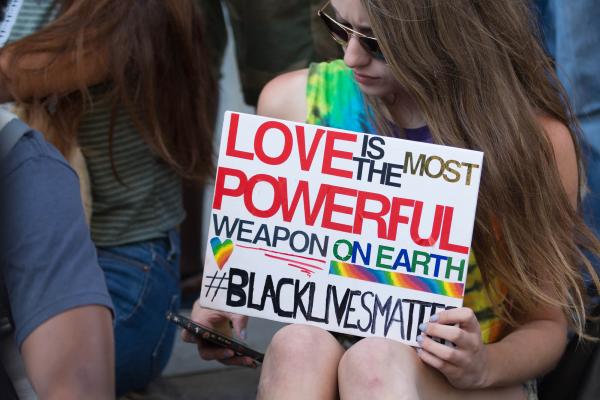I grew up in Atlanta in an overwhelmingly white suburb and church, but in schools that were roughly 40 percent white and 40 percent black. Because of this, I used to believe I experienced a diverse upbringing. But in reality, it sheltered me just enough that I was in my mid-twenties before I really began to grapple with racism.
I’ve written before about how my coming out five years ago helped me to recognize my white privilege. Coming out flipped a switch for me. The realities of pursuing ordained ministry as an out bisexual woman made me profoundly aware that entrenched systems of bias and discrimination sometimes worked against me, even while they often worked in my favor. I’m not proud that it took recognizing my own experiences of oppression to also recognize my privilege, but I responded to both by becoming a committed activist.
As I have advocated for justice for LGBTQ people, I have also sought to work for racial justice. In seeking to be a race ally, I have learned that I have to first recognize the insidiousness of white supremacy in our culture, and begin to acknowledge all of the ways I have benefitted from it and perpetuated it, even if unintentionally. And then, having begun to wrestle with the enormity of these realities, I have to actively work against them — learning more about racial justice, uplifting the voices of people of color, and calling out racism and white supremacy where I encounter it.
Even now, after years of actively educating myself about racism and seeking to dismantle my own privilege, I find that the part of allyship I struggle with most is the fear of failure. The more I learn about racism and white privilege, the more overwhelmed I am by all the ways I have messed up, and all the ways I could still mess up. I am petrified of making things worse in my attempt to make them better, and so often my first response to racial injustice when I encounter it is to freeze and stand on the sidelines, hoping someone else does the work.
This fear of failing as an ally, and the inability to act that comes as a result, is not unusual. In fact, I’d argue it’s a common part of the process of becoming an ally. In some ways, it’s a healthy fear — it keeps the “white savior” impulse in check. But left unchallenged, fear of failure can be just as destructive to the movement for racial justice as outright racism: The one clear and certain way to fail at being an ally is to do nothing at all.
On some level, the fear of messing up as an ally stems from a desire to avoid hurting others. When we finally begin to recognize how terrible the problem of racism is, the last thing we want to do is be a part of that problem. But on another level, even this well-meaning thought process continues to place ourselves at the center, instead of the people with whom we are seeking to be allies. Being committed to justice means working for a better world — even when that work requires allies to step back and support people of color and others who are marginalized as they lead the way.
Our place as supporters is to educate ourselves and other allies. Our role is to call out racism wherever we encounter it — even and especially when perpetuated by people we care about. Our goal is to center to the stories, voices, and experiences of people of color, and to follow their lead.
The reality of our privilege is that it makes many truths of systemic injustice unclear to us. We fumble around with murky awareness and bump into our own ingrained racism and ignorance. As allies, the question for us is not if we will screw up, but how we will move forward when we inevitably do.
Here is a process I have learned for myself:
If I want to act but I’m worried about getting it wrong, I check in with another ally or several to see what they think. I try to find existing resources from people of color that will help me understand how I should act. (This is different, by the way, than asking a person of color to make time to educate me).
Often, if it turns out that my strategy was misguided, I can feel defensive and declare that I want to give up. If that happens, I keep those feelings to myself or process them with another ally. I work to move past my defensiveness and give thanks that what I’ve learned has better prepared to be an effective ally.
If I learn this lesson only after I’ve acted and messed up, I follow the same protocol. I try to work through the guilt I feel on my own or with other close ally friends rather than seeking absolution from the people of color whom I’ve wronged. I remind myself that they have a right to be upset. I apologize and correct myself where I can and I commit to doing better in the future. And then I move forward, still committed to the work of allyship.
Of course, in reality, it usually feels a lot messier and more uncomfortable than that. But as time goes on, I’m learning that this process is as crucial to the work of allyship as the moments when I get it right. This is how it goes. We learn, we act, we mess up, we repent, we continue to learn, we continue to act, and we continue to support the work of racial justice.
We cannot promise to never mess up, but we can promise not to let our fear of failure keep us from doing the work. We can promise to try and try again. We cannot commit to being perfect, but we can commit to doing better — and then get to work.
Got something to say about what you're reading? We value your feedback!

